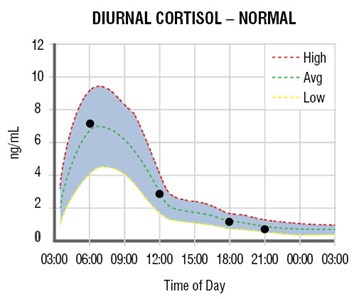Cortisol
What is cortisol?
Cortisol is a hormone synthesized and secreted by the adrenal glands of the kidneys that plays a major role in regulating stress, metabolism, and immunity. It follows a circadian rhythm that is affected by sleep- naturally rising in the early morning and falling in the evening.

Why is it included in the Balance axis?
High cortisol levels are an indicator of acute (sudden), chronic (long-term), and/or traumatic (life-threatening) stress. Secondary factors associated with mental stress include alcohol drinking, smoking, a lack of exercise, inadequate sleep, and poor nutrition. Over time, prolonged high levels of cortisol (Cushing's disease) can lead to weight gain, fat redistribution, poor sleep, a lowered immune system, and increased inflammation. Low levels might indicate poor adrenal function or Addison's disease.
How can I better understand my results?
- Peaks in the morning between 6 am - 8 am: 10-20 ug/dL
- Falls in the evening around 4 pm: 3-10 ug/dL
While levels in the lower range are better for inflammation, morning cortisol levels under 3 ug/dL may indicate adrenal insufficiency, and above 50 ug/dL could indicate Cushing's disease. Keep in mind that certain medications can raise cortisol levels.
If your cortisol levels are on the higher side, try:
- Herbs and natural supplements such as ashwagandha, Rhodiola, lemon balm, and chamomile
- Aim for 8 hours of restful sleep (avoid caffeine after midday, wear blue-light blocking glasses, put the screens away before bed)
- Spend more time in nature
- Practice yoga, tai chi, qi gong, and other mindfulness meditation and breathing exercises
- Foods such as dark chocolate, garlic, fermented foods (kimchi, yogurt), and plants high in vitamin C (oranges, broccoli)
- Surround yourself with healthy relationships (pets are a plus!)
If your cortisol levels are on the lower side, you can try:
Where can I learn more?
Cleveland Clinic - How to Reduce Cortisol and Turn Down the Dial on Stress
Huberman Lab Video/Podcast - Tools for Managing Stress and Anxiety
The above is informational content only. None of it is intended as medical or diagnostic advice. Please consult your provider for information or concerns regarding your results
